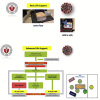CardioPulmonary Resuscitation in patients with suspected or confirmed Covid-19. A consensus of the Working group on CardioPulmonary Resuscitation of the Hellenic Society of Cardiology
- PMID: 32949726
- PMCID: PMC7495187
- DOI: 10.1016/j.hjc.2020.09.010
CardioPulmonary Resuscitation in patients with suspected or confirmed Covid-19. A consensus of the Working group on CardioPulmonary Resuscitation of the Hellenic Society of Cardiology
Abstract
The unprecedented for modern medicine pandemic caused by the SARS-COV-2 virus ("coronavirus", Covid-19 disease) creates in turn new data on the management and survival of cardiac arrest victims, but mainly on the safety of CardioPulmonary Resuscitation (CPR) providers. The Covid-19 pandemic resulted in losses of thousands of lives, and many more people were hospitalized in simple or in intensive care unit beds, both globally and locally in Greece. More specifically, in victims of cardiac arrest, both in- and out- of hospital, the increased mortality and high contagiousness of the SARS-CoV-2 virus posed new questions, of both medical and moral nature/ to CPR providers. What we all know in resuscitation, that we cannot harm the victim and therefore do the most/best we can, is no longer the everyday reality. What we need to know and incorporate into decision-making in the resuscitation process is the distribution of limited human and material resources, the potentially very poor outcome of patients with Covid-19 and cardiac arrest, and especially that a potential infection of health professionals can lead in the lack of health professionals in the near future. This review tries to incorporate the added skills and precautions for CPR providers in terms of both in- and out- hospital CPR.
Keywords: ALS; BLS; COVID-19; CPR; Resuscitation.
Copyright © 2020 Hellenic Society of Cardiology. Published by Elsevier B.V. All rights reserved.
Figures



References
-
- Fritz Z., Perkins G.D. Cardiopulmonary resuscitation after hospital admission with covid-19. BMJ. 2020;369:m1387. - PubMed
-
- Latsios G., Antonopoulos A., Vogiatzakis N., et al. Successful primary PCI during prolonged continuous cardiopulmonary resuscitation with an automated chest compression device (AutoPulse) Int J Cardiol. 2016;225:258–259. - PubMed
Publication types
MeSH terms
LinkOut - more resources
Full Text Sources
Medical
Miscellaneous

